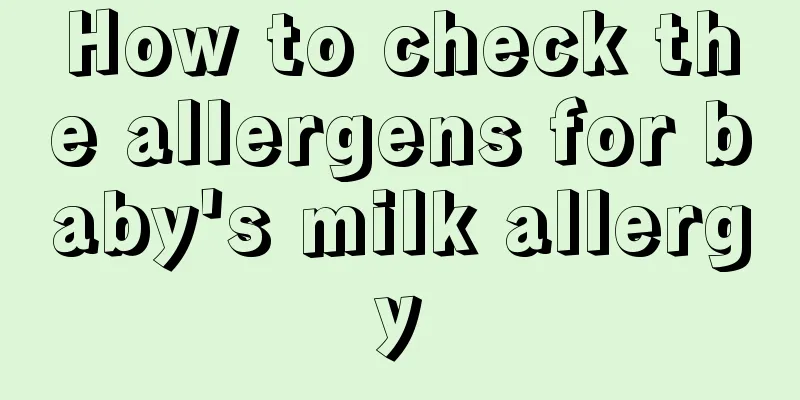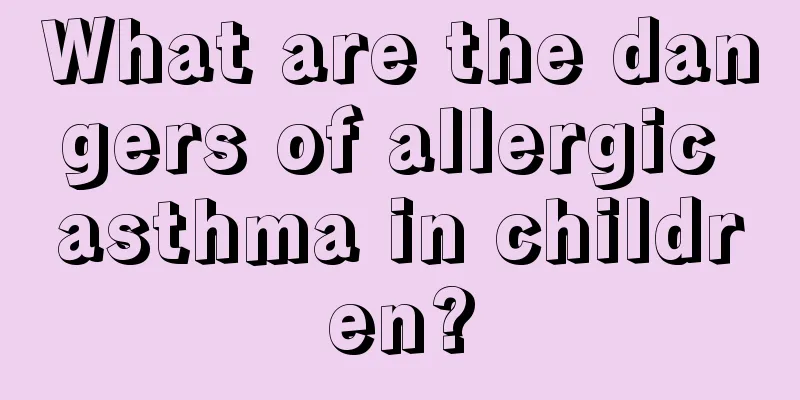How to check the allergens for baby's milk allergy

|
After birth, the baby's body is still in the development stage. During this period, the baby's body resistance is relatively low. It is very common for babies to be allergic to milk. This is usually caused by the incomplete development of the baby's immune system. You can check the baby's allergens through allergen testing and pay more attention to the baby's diet. How to check the allergens for baby's milk allergy? Substances that can induce allergic reactions in the human body have a professional term in medicine called allergens. The consequences of allergic reactions can be mild or severe, so everyone should never underestimate its existence. In order to reduce the harm caused by the reaction, parents and friends are advised to take their children to the hospital for allergen examinations to find the root cause of the allergy in order to effectively prevent it. Check for allergens in babies Children under one year old are not suitable for allergy testing because their immune system is slowly building and maturing. The changes during this period are very slow and cannot be reflected in the test. Any test has a limit. If the test is within the limit, it is negative; if the test is outside the limit, it is positive. Therefore, it is generally not recommended to check for allergens in children who have had allergies for less than six months, because the child’s allergy history is too short and it is very likely that the child has not yet reached the level of positive allergy. However, this does not mean that the child is not allergic. How to check for allergens in children 1. Food record method: record the types of food eaten each month, such as rice, eggs, shrimp, chicken, cucumbers, tomatoes, etc., the time of intake (such as month, day, hour, etc.), and the time when urticaria occurs. 2. Skin test: This type of test can usually be done in a dermatologist or respiratory department. The method is simple and not uncomfortable for children. Use an empty needle to inhale skin test solution containing milk, rice, soybeans, etc., and make multiple pricks on the upper arm to observe allergic reactions to various foods. However, due to the complexity of food digestion and absorption in the body, the physiological and biochemical changes that occur cannot be fully reflected in the process. Therefore, even if the results are positive, a comprehensive clinical analysis is required to finally determine whether it is the food that causes allergies. The process of checking allergens is complicated and requires a certain amount of waiting time. From the above introduction, we can know that 3-month-old babies are not suitable for allergen testing because the child is in the process of building their immune system. If you insist on letting your child do allergy testing at this time, the results will not be of any reference, so parents should be aware of this. |
<<: What to do if a child has a low-grade fever
>>: One year and ten months old baby intelligence
Recommend
Baby coughing before bed
The physical health of children is often the most...
What are the recipes for babies with zinc deficiency?
It is a common phenomenon that babies lack zinc. ...
How to treat infantile hemangioma?
Many infants and young children have some birthma...
What causes children’s teeth to turn black?
A baby is a very important member of a family. Ev...
What to do if your baby is a light sleeper
There are many new parents who always pay great a...
What are the dangers of scrotal effusion in children?
When children are young, there will always be som...
The child has difficulty breathing. What's going on?
As children grow physically, their organs will al...
What to do if children have fever and cold
The occurrence of fever and cold in children will...
Why are baby's palms wet when he has a fever?
Infants and young children are prone to symptoms ...
How to improve the granular stool of baby
Parents definitely love their newborns very much....
What is the treatment for mycoplasma infection in children?
We all know that the younger the child is, the we...
What are the symptoms of foreskin inflammation in children?
Many parents know that it is not good for their c...
Is it normal for a baby to have growing teeth first?
When the baby is just born, he will not have teet...
What are the symptoms of teenage depression?
Nowadays, people are under great pressure in life...
Causes of long-term constipation in infants
We all know that infants and young children have ...









